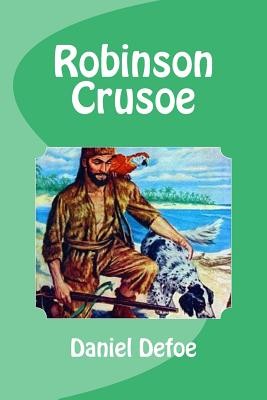
- We will send in 10–14 business days.
- Author: Daniel Defoe
- Publisher: CreateSpace Independent Publishing Platform
- Year: 2016
- Pages: 238
- ISBN-10: 1530926556
- ISBN-13: 9781530926558
- Format: 15.2 x 22.9 x 1.3 cm, softcover
- Language: English
- SAVE -10% with code: EXTRA
Reviews
Description
Robinson Crusoe is a novel by Daniel Defoe, first published on 25 April 1719. The first edition credited the work's protagonist Robinson Crusoe as its author, leading many readers to believe he was a real person and the book a travelogue of true incidents. Epistolary, confessional, and didactic in form, the book is presented as an autobiography of the title character (whose birth name is Robinson Kreutznaer)-a castawaywho spends thirty years on a remote tropical island near Trinidad, encountering cannibals, captives, and mutineers before being rescued. Statue of Robinson Crusoe at Alexander Selkirk's birthplace of Lower Largo by Thomas Stuart Burnett The story has since been perceived to be based on the life of Alexander Selkirk, a Scottish castaway who lived for four years on the Pacific island called "Más a Tierra," now part of Chile, which was renamed Robinson Crusoe Island in 1966, but the time scale does not match. Other suggested sources for the narrative are the Latin or English translations of Ibn Tufail's Hayy ibn Yaqdhan, an earlier novel also set on a desert island. Another source for Defoe's novel could have been the Robert Knox account of his abduction by the King of Ceylon in 1659 in "An Historical Account of the Island Ceylon." In his 2003 book In Search of Robinson Crusoe, Tim Severin contends that the account of Henry Pitman in a short book chronicling his escape from a Caribbean penal colony and subsequent shipwrecking and desert island misadventures is the inspiration for the story. Arthur Wellesley Secord in his Studies in the narrative method of Defoe (1963: 21-111) painstakingly analyses the composition of Robinson Crusoe and gives a list of possible sources of the story, rejecting the common theory that the story of Selkirk is Defoe's only source.
- Author: Daniel Defoe
- Publisher: CreateSpace Independent Publishing Platform
- Year: 2016
- Pages: 238
- ISBN-10: 1530926556
- ISBN-13: 9781530926558
- Format: 15.2 x 22.9 x 1.3 cm, softcover
- Language: English English
Robinson Crusoe is a novel by Daniel Defoe, first published on 25 April 1719. The first edition credited the work's protagonist Robinson Crusoe as its author, leading many readers to believe he was a real person and the book a travelogue of true incidents. Epistolary, confessional, and didactic in form, the book is presented as an autobiography of the title character (whose birth name is Robinson Kreutznaer)-a castawaywho spends thirty years on a remote tropical island near Trinidad, encountering cannibals, captives, and mutineers before being rescued. Statue of Robinson Crusoe at Alexander Selkirk's birthplace of Lower Largo by Thomas Stuart Burnett The story has since been perceived to be based on the life of Alexander Selkirk, a Scottish castaway who lived for four years on the Pacific island called "Más a Tierra," now part of Chile, which was renamed Robinson Crusoe Island in 1966, but the time scale does not match. Other suggested sources for the narrative are the Latin or English translations of Ibn Tufail's Hayy ibn Yaqdhan, an earlier novel also set on a desert island. Another source for Defoe's novel could have been the Robert Knox account of his abduction by the King of Ceylon in 1659 in "An Historical Account of the Island Ceylon." In his 2003 book In Search of Robinson Crusoe, Tim Severin contends that the account of Henry Pitman in a short book chronicling his escape from a Caribbean penal colony and subsequent shipwrecking and desert island misadventures is the inspiration for the story. Arthur Wellesley Secord in his Studies in the narrative method of Defoe (1963: 21-111) painstakingly analyses the composition of Robinson Crusoe and gives a list of possible sources of the story, rejecting the common theory that the story of Selkirk is Defoe's only source.


Reviews